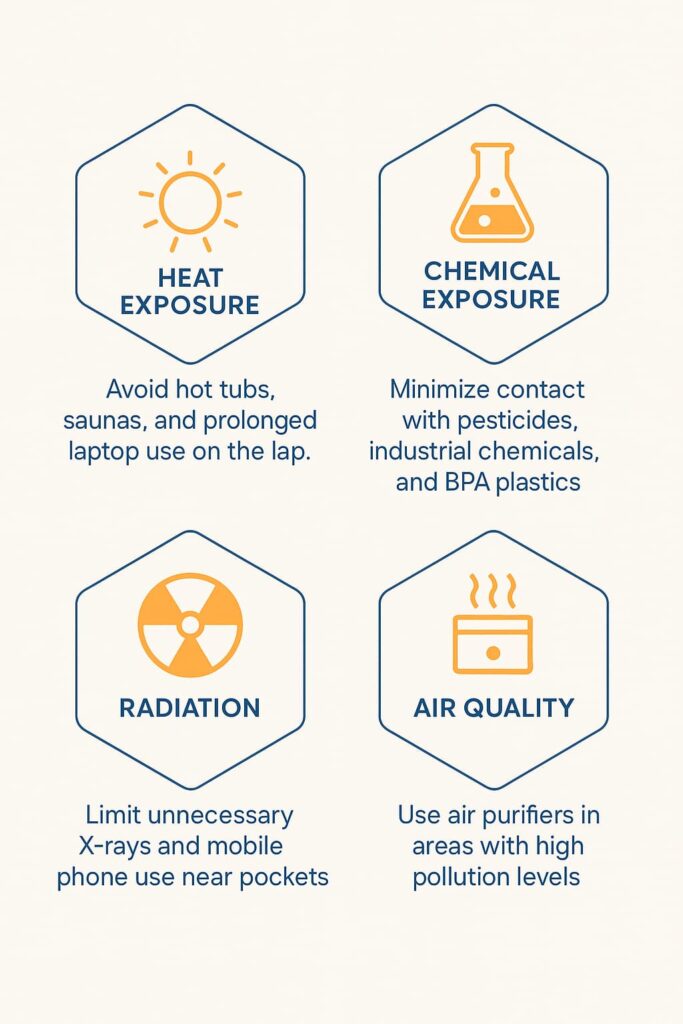How to Improve Sperm Quality with Science-Backed Methods
Evidence-Based Ways to Improve Sperm Quality
Men seeking to enhance their fertility often face a confusing landscape of advice—from well-meaning but unverified home remedies to expensive treatments with limited evidence. Yet recent research reveals that specific, evidence-based approaches can meaningfully improve sperm quality. In fact, lifestyle interventions can influence sperm health in as little as 8-12 weeks, presenting a significant opportunity for those looking to optimize their reproductive potential.
Whether you’re actively trying to conceive, planning for the future, or simply interested in optimizing your reproductive health, understanding how to improve sperm quality can make a substantial difference in fertility outcomes.
Key Takeaways
- Sperm quality encompasses multiple parameters beyond just count including motility, morphology, volume, and DNA integrity—improvements in any of these factors can significantly enhance overall fertility potential.
- Dietary changes can dramatically improve sperm health, with the Mediterranean diet showing particularly strong benefits, as men following this eating pattern have 2.6 times lower likelihood of abnormal sperm parameters.
- Evidence-based supplements can enhance sperm quality, with clinical trials supporting Vitamin E (400 IU daily) for improved motility and CoQ10 for increased count, progressive motility, and testosterone levels.
- Optimal ejaculation frequency depends on your goals, with shorter abstinence (1-2 days) improving motility and DNA integrity, while longer periods (3-5 days) increase volume and concentration.
- Environmental factors significantly impact sperm health, requiring reduction in exposure to heat (hot tubs, laptops), chemicals (BPA, pesticides), radiation, and air pollution to protect sperm quality.
Understanding Sperm Quality: Beyond Just Count
When discussing sperm quality, many people focus exclusively on count (concentration). However, comprehensive sperm health encompasses multiple parameters:
- Count: The concentration of sperm cells (normal is 15 million or more per milliliter)
- Motility: The percentage of sperm that can move efficiently
- Morphology: The percentage of sperm with normal shape and structure
- Volume: The amount of semen produced
- DNA integrity: The genetic health of sperm cells
Improvements in any of these parameters can significantly enhance overall fertility potential. The good news? Research shows these factors respond positively to specific lifestyle interventions.
Dietary Interventions That Transform Sperm Health
What you eat has a profound impact on sperm quality. A 2024 randomized controlled trial published in Frontiers in Endocrinology demonstrated that targeted dietary changes can dramatically improve motility parameters. After a 16-week low-energy diet (800 kcal/day), men with normal sperm count experienced an increase in total motility from 48% to 60% and progressive motility from 41% to 53%. Even more impressive, men with oligozoospermia (low sperm count) saw total motility increase from 35% to 52%.
The Mediterranean Diet Connection
A systematic review examining 10 studies found that men with high adherence to the Mediterranean diet had a 2.6 times lower likelihood of abnormal sperm parameters compared to those with low adherence. This diet emphasizes:
- Olive oil as the primary fat source
- Abundant fruits, vegetables, and legumes
- Moderate consumption of fish
- Limited red meat and processed foods
- Moderate red wine consumption (though alcohol moderation is key)
Case Study: University of Copenhagen’s Weight Loss Intervention
Challenge: Obese men facing reduced semen quality and low sperm count adversely affecting fertility.
Solution: An 8-week low-calorie diet (800 kcal/day) combined with various maintenance strategies over 52 weeks.
Results: Participants lost an average of 16.5 kg, achieving approximately a 49% increase in sperm concentration and a 41% increase in sperm count. Most importantly, these improvements remained stable after one year among those who maintained their weight loss.
Key Takeaway: Significant weight loss through intensive dietary intervention can markedly improve key sperm parameters with lasting results.
Supplementation Strategies with Clinical Support
While diet should form the foundation of sperm health improvements, targeted supplementation can enhance results. Recent clinical trials have identified several supplements with measurable benefits:
Vitamin E: A Proven Motility Booster
A triple-blind randomized controlled trial published in 2025 showed that vitamin E supplementation (400 IU daily for 3 months) led to a significantly higher improvement in sperm motility compared to placebo (P = 0.03). The study also found significant improvements in count and morphology (P < 0.001). This research validates vitamin E as an effective antioxidant therapy for enhancing key sperm parameters.
CoQ10: Energy for Stronger Swimmers
The antioxidant Coenzyme Q10 (CoQ10) has shown particularly promising results. A 2024 meta-analysis of eight randomized controlled trials revealed CoQ10 supplementation significantly improved total sperm counts, enhanced progressive motility, and increased serum testosterone levels, according to Frontiers in Pharmacology.
Case Study: Bird&Be’s Targeted Supplement Approach
Challenge: Male-factor infertility with low sperm motility among patients trying to conceive.
Solution: Development and clinical testing of ‘The Powers for Males + CoQ10 Boost’—a daily supplement containing CoQ10, vitamins, zinc, selenium, DHA, L-carnitine, and antioxidants administered over 90 days.
Results: A statistically significant 52.2% increase in progressive sperm motility measured via lab-based semen analysis after 90 days.
Key Takeaway: Targeted antioxidant supplementation can significantly boost sperm motility in men with infertility issues when properly formulated and consistently used.
Lifestyle Modifications That Make a Difference

Exercise: Finding the Right Balance
Regular moderate exercise has been shown to positively impact sperm production. According to WebMD, implementing a consistent exercise regimen with sessions at least three times per week for one hour can lead to measurable increases in both sperm count and motility. However, excessive or extreme exercise may have the opposite effect, highlighting the importance of balance.
Moderate activities such as brisk walking, swimming, and recreational sports appear most beneficial. These activities improve circulation, reduce oxidative stress, and optimize hormonal balance—all crucial for sperm development.
Optimizing Ejaculation Frequency
A common question among men looking to improve sperm quality is how often they should ejaculate. A 2024 meta-analysis of 13 studies provides evidence-based guidance: shorter ejaculatory abstinence (under 2-3 days) is associated with higher progressive sperm motility and lower sperm DNA fragmentation, while longer abstinence increases sperm concentration and volume.
This research suggests that different sperm quality goals might benefit from different abstinence intervals:
- For improved motility and DNA integrity: 1-2 days between ejaculations
- For higher volume and concentration: 3-5 days between ejaculations
For men preparing to undergo fertility testing, understanding the optimal timing can help provide the most accurate assessment. Those curious about the sperm donation process should know that clinics typically recommend specific abstinence intervals to optimize sample quality.
The Stress-Fertility Connection
Chronic stress elevates cortisol levels, which can interfere with testosterone production and sperm development. Implementing stress reduction techniques such as mindfulness meditation, regular exercise, adequate sleep, and work-life balance can help maintain optimal hormonal conditions for sperm production.
Environmental Factors: Reducing Toxic Exposure
Your surroundings significantly impact sperm health. A 2024 systematic review in the International Journal of Environmental Research and Public Health confirmed that exposure to air pollution, specifically PM2.5, is associated with decreased sperm motility and density, along with increased DNA fragmentation.
Key environmental factors to address include:
- Heat exposure: Avoid hot tubs, saunas, and prolonged laptop use on the lap
- Chemical exposure: Minimize contact with pesticides, industrial chemicals, and certain plastics containing BPA
- Radiation: Limit unnecessary X-rays and keep mobile phones away from pockets
- Air quality: Use air purifiers in areas with high pollution levels

Advanced Technologies in Sperm Analysis
Modern technology offers new ways to monitor and improve sperm quality. AI-powered analysis tools are revolutionizing how sperm quality is assessed and tracked.
Case Study: Monash University & Monash IVF’s AI Innovation
Challenge: Inefficiencies and potential sperm damage caused by traditional, manual sperm analysis methods in IVF clinics.
Solution: Implementation of an AI-powered technology to analyze live, unstained sperm images, automating sperm morphology assessment with over 93% accuracy.
Results: The technology achieved reduced reliance on invasive procedures, improved consistency in sperm selection, and potential for increased IVF success rates through rapid, non-invasive analysis.
Key Takeaway: AI-driven sperm analysis streamlines clinical workflows and enhances the accuracy of sperm quality assessments, providing more reliable information for fertility treatment decisions.
Home testing kits also provide a private way to monitor improvements over time, though they typically offer less comprehensive data than clinical assessments. These tools can be particularly valuable for tracking progress when implementing the strategies discussed in this article.
When to Seek Professional Help
While self-directed improvements can significantly enhance sperm quality, some situations warrant professional consultation:
- No conception after 12 months of regular, unprotected intercourse
- Known medical conditions that may affect fertility (diabetes, hormonal disorders, etc.)
- History of reproductive tract injuries or surgeries
- Symptoms of hormonal imbalance (erectile dysfunction, reduced body hair, etc.)
- Exposure to significant environmental toxins or medications that affect fertility
Urologists and reproductive endocrinologists specialize in male fertility evaluation and can offer personalized treatment plans based on comprehensive testing. For some men, the decision to donate sperm may also arise during fertility investigations, as learning about their own reproductive health increases awareness of how they might help others.
Conclusion: A Multi-Faceted Approach to Sperm Quality
Improving sperm quality requires a holistic approach that addresses multiple factors simultaneously. The research is clear: dietary changes, appropriate supplementation, regular moderate exercise, stress management, and reduced environmental toxin exposure can collectively lead to significant improvements in sperm parameters.
Most importantly, these improvements can occur within a relatively short timeframe—many studies show measurable changes within 2-3 months, corresponding to the sperm development cycle. This means that the actions you take today could positively influence your fertility within the next season.
Whether you’re actively trying to conceive or simply wanting to optimize your reproductive health, implementing these evidence-based strategies can make a meaningful difference. And for those interested in helping others on their fertility journey, consider learning about how you can help families by donating sperm.
